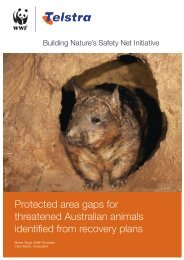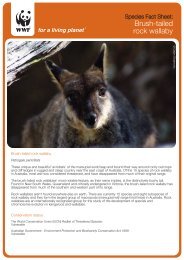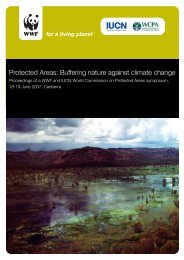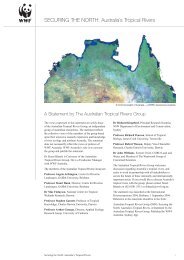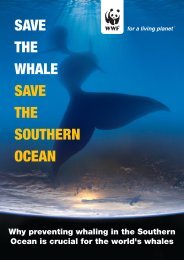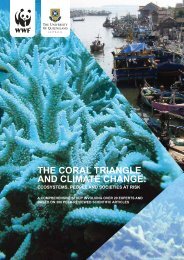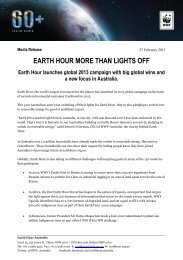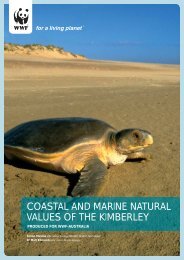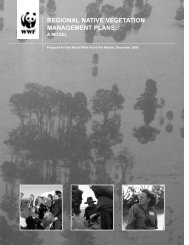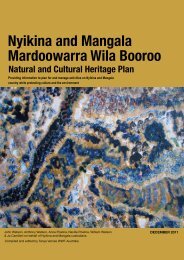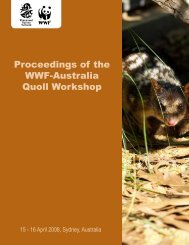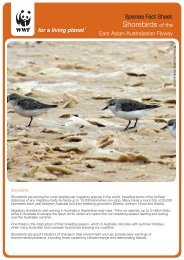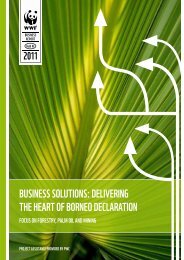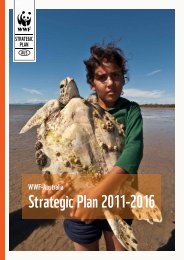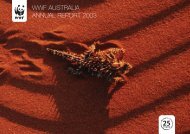Indigenous Peoples and Conservation Organizations
Indigenous Peoples and Conservation Organizations
Indigenous Peoples and Conservation Organizations
Create successful ePaper yourself
Turn your PDF publications into a flip-book with our unique Google optimized e-Paper software.
120 The Ju/’hoan in Namibia<br />
local resource manager see clear linkages<br />
between costs <strong>and</strong> benefits: As farmers manage<br />
resources more intensively to increase population<br />
numbers, they receive the benefit of higher quotas.<br />
These quotas generally translate into financial<br />
returns through live sale, tourism, <strong>and</strong> trophy<br />
hunting. It is assumed that these benefits will be<br />
incentives to use natural resources sustainably,<br />
thereby helping to improve conservation of biodiversity<br />
<strong>and</strong> habitats outside of protected areas<br />
like the Khaudum Game Reserve.<br />
Although Namibia now has strong legislation for<br />
community wildlife management, it does not<br />
directly address the greatest threat to the<br />
Ju/’hoan, the lack of secure tenure over their l<strong>and</strong><br />
<strong>and</strong> other resources. In the case of the challenge<br />
posed by the Herero cattle herds, the partnership<br />
between the NNFC <strong>and</strong> MET to establish a conservancy<br />
may have influenced the government’s<br />
decision in June 1997 to order the Herero to<br />
leave Nyae Nyae. However the growing pressure<br />
being brought to bear by Bushmen both inside<br />
<strong>and</strong> outside the country for tenure rights may<br />
also have played a role. 2 At any rate, by the end<br />
of 1997 all but one Herero family had complied.<br />
III. The Evolution of Communitybased<br />
Natural Resource<br />
Management in Nyae Nyae<br />
The story of how a partnership formed to bring<br />
effective community-based natural resource management<br />
to Nyae Nyae is complicated. It extends<br />
over nearly a decade <strong>and</strong> involves an extensive<br />
cast of actors (see figure 7.3). The story proceeds<br />
in three phases: impasse <strong>and</strong> the search for new<br />
approaches; revamping community institutions to<br />
take ownership of the project; <strong>and</strong> negotiating with<br />
outsiders to create a conservancy. Because there<br />
are so many diverse threads to this story, these<br />
phases contain areas of overlap. Like snapshots<br />
taken at three intervals, they show the growth <strong>and</strong><br />
capacity of community organization among the<br />
Ju/’hoan as they struggle to become effective<br />
stakeholders in managing the l<strong>and</strong> they live on.<br />
3.1 Institutional Gridlock <strong>and</strong> a New LIFE<br />
(1990–1995)<br />
To a great extent, what is happening in Namibia<br />
today would not have been possible without fundamental<br />
policy changes at the national level.<br />
MET did not begin with a blank slate. It inherited<br />
field staff, policies, <strong>and</strong> a history of conflict<br />
with communities from its colonial predecessor,<br />
the Department of Nature <strong>Conservation</strong> (DNC).<br />
Charged with managing wildlife throughout the<br />
country, the DNC concentrated on a system of<br />
parks <strong>and</strong> game reserves <strong>and</strong> limited its rural outreach<br />
activities to law enforcement, the control of<br />
problem animals (predators killing livestock <strong>and</strong><br />
elephants destroying crops), <strong>and</strong> ad hoc environmental<br />
awareness-building. In Nyae Nyae, most<br />
of the effort went into building up the infrastructure<br />
of the Khaudum Game Reserve <strong>and</strong> restricting<br />
its use by local people. Water points were<br />
constructed to encourage game to enter the<br />
reserve, <strong>and</strong> DNC staff patrolled to control<br />
poaching by local people. They had the authority<br />
to enter people’s homes to apprehend suspects<br />
<strong>and</strong> to build campsites on community l<strong>and</strong> for<br />
use by government staff. Many such activities<br />
were carried out without consulting local residents<br />
or n!ore leaders.<br />
Following independence, the DNC was replaced<br />
by MET. The pace of change since 1990 has<br />
been rapid, as the new ministry has increasingly<br />
focused on the development of ideas <strong>and</strong> practices<br />
that link conservation with development to<br />
improve the quality of life for all Namibians. In<br />
1991, MET began reaching out to local NGOs to<br />
conduct socio-ecological surveys of local views<br />
about resource management to identify problems<br />
<strong>and</strong> solutions. The survey in Nyae Nyae was the<br />
beginning of a different kind of relationship<br />
between the agency <strong>and</strong> the community. While it<br />
did not result in joint planning <strong>and</strong> implementation<br />
of wildlife management, it legitimized faceto-face<br />
contacts <strong>and</strong> began a dialogue that might<br />
one day make those outcomes possible.<br />
At the time, of course, one could not tell what<br />
direction was being followed. Certainly MET<br />
delivered confusing <strong>and</strong> contradictory messages<br />
to the people of Nyae Nyae. Those messages<br />
reflected deep conflicts within the ministry<br />
between those who thought nature had to be protected<br />
from local people <strong>and</strong> those who wanted<br />
to find a new way. One day representatives from<br />
MET would arrive bringing promises of local<br />
control over <strong>and</strong> benefit from the community’s<br />
wildlife, while the next day another set of staff<br />
would install pumps at water points for game



